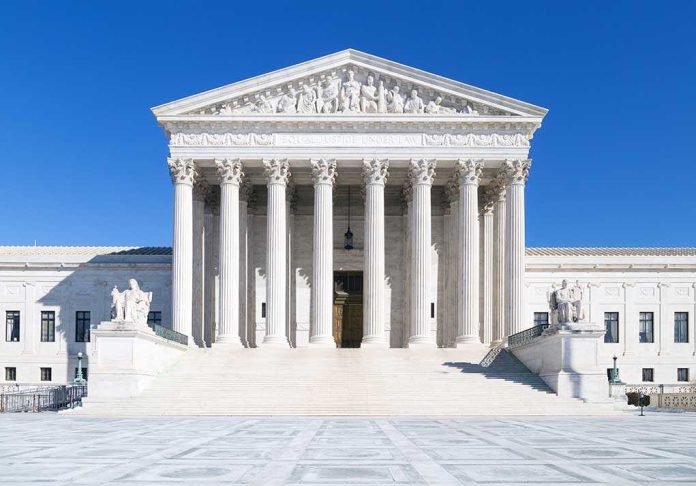
Liberals’ dire warnings of a Supreme Court plot to abolish same-sex marriage have proven hollow, exposing another round of baseless political fearmongering that distracted from real policy debates.
Story Highlights
- The Supreme Court has not moved to reverse or weaken same-sex marriage rights since 2022.
- Liberal activists and politicians stoked fears of an imminent rollback, but no such threat materialized.
- Congress passed the Respect for Marriage Act, further securing federal recognition of same-sex unions.
- Judicial precedent and legislative action have stabilized marriage equality, despite years of left-wing alarmism.
Liberal Alarmism Exposed by Judicial Reality
After the Supreme Court overturned Roe v. Wade in 2022, progressive activists and media outlets declared that a conservative Court would immediately target same-sex marriage, unleashing a wave of national anxiety. These claims gained traction as pundits drew direct lines from the Dobbs decision to an alleged plot against Obergefell v. Hodges, the 2015 ruling that recognized same-sex marriage nationwide. However, in the years since, the Supreme Court has taken no action to revisit or undermine the Obergefell precedent, rendering these warnings unfounded and highlighting a recurring pattern of political panic over constitutional rights.
Despite relentless narratives about an impending rollback, the Supreme Court’s conservative majority has not entertained any cases seeking to overturn same-sex marriage rights. Justice Clarence Thomas’s solo suggestion in his Dobbs concurrence that the Court reconsider certain precedents was not echoed by any other justice, and no subsequent case has gained traction. Instead, the judicial reality has been one of stability, not upheaval—contradicting claims that fundamental rights were on the chopping block. This gap between rhetoric and reality has undermined the credibility of those who weaponized the Court as a political scarecrow.
Legislative Safeguards and Political Posturing
In response to left-wing agitation, Congress passed the Respect for Marriage Act in late 2022, which codified federal and interstate recognition of same-sex marriages. While supporters heralded this move as essential protection, it also served as a political tool to rally progressive voters and fundraisers around a manufactured crisis. The Act, now law, offers federal guarantees for existing marriages, yet the judicial authority of the Supreme Court remains the ultimate arbiter. Thus, legislative and judicial safeguards for marriage equality coexist, despite years of doomsday predictions from activists and politicians.
Critics point out that the Respect for Marriage Act’s passage became a spectacle, exploited by Democrats and advocacy groups to stoke fears, distract from economic mismanagement, and obscure failures on issues like inflation, border security, and crime. With no active Supreme Court cases threatening marriage equality, the narrative has shifted from legal peril to ongoing vigilance, even as the basis for emergency has evaporated. This outcome raises questions about the misuse of constitutional anxieties for short-term political gain at the expense of focusing on urgent national priorities.
Conservative Values and Constitutional Stability
The persistent, unfounded warnings about a Supreme Court attack on marriage rights reflect a broader trend: progressive operatives leveraging the judiciary as a political boogeyman. For conservatives, the true threats to American liberty remain unchecked government overreach, fiscal irresponsibility, and efforts to erode constitutional safeguards like the Second Amendment and federalism. The stability of marriage equality since Dobbs demonstrates that the Constitution—and the men and women appointed to interpret it—are not so easily swayed by partisan hysteria. Instead, Americans see the wisdom of limited government, balanced powers, and the need to focus on real challenges, not manufactured crises.
"Liberals Insisted the Supreme Court Was ‘Plotting’ To Abolish Gay Marriage. They Were Wrong, Obviously." – Free Beacon #SmartNews https://t.co/C87QmvsFIz
— Gene Melius (@gene_melius2) November 11, 2025
As the Trump administration pursues its agenda on border security, fiscal reform, and restoring constitutional order, the contrast could not be sharper: while the left conjures threats that fail to materialize, conservative leadership is addressing the pressing issues facing American families. The Supreme Court’s restraint on marriage equality stands as a reminder to all Americans—especially those tired of endless culture war theatrics—that the nation’s core institutions are resilient, and that genuine threats to liberty come not from imagined conspiracies, but from the erosion of foundational values and the rule of law.
Sources:
Obergefell v. Hodges – Wikipedia











